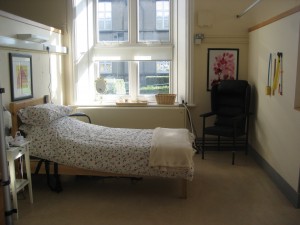
Having a stroke or suffering from any brain impairment rocks people to their core.
Royal Donnybrook Hospital is dedicated to helping people at this vulnerable time. Joe Cannon runs the Occupational Therapy unit, “Our aim is to get a patient adapted to the changes they have undergone and get them ready to live back in the own home.” They have an award winning ‘Activity of Daily Living Centre’ (ADL) which shows patients first-hand how they can manage safely and happily once they leave the hospital. Like a set from a TV show, patients, carers and their families can explore the different options there are to turn their home into a safe environment.
Purpose built staircases highlight different stair lifts and a range of bedroom options promote independence. There are two fully adapted bathrooms with level shower access and raised toilet seats and grab bars so the patient feels safe getting in and out of bed to use the toilet at night.
In the ADL kitchen with the press of a button the worktop raises and lowers to either wheelchair height or a standing height, so it can accommodate everyone in your home. Also there were simple items like a kettle cradle to help pour a heavy kettle, to breadboards with a sharp cutting knife attached for anyone with poor mobility in one arm.
They also work with technology, particularly iPads, to help patients who have challenges with their speech. Using the ‘grid player’ app a patient can press a number of one button requests to say ‘I need a drink’ or ‘I am hungry’. Or type in letter by letter to create their own sentence. They use the iPad for simple memory apps to help them regain some of the ability they have lost. While others use the iPads to Skype relations abroad and have daily or weekly chats with them so they don’t have that sense of isolation that can often occur.
“We are really only at the beginning of what we can achieve with the iPads and I can see them being a key part of our rehabilitation package in the future,” Joe continues. Friends of RDH are a dedicated group of volunteers who fundraise in the hospital. One event raised the money to buy a state of the art FSA Pressure Map, which fits under a cushion or chair pad and shows how pressure is distributed by the patient. The aim is to prevent bed sores and detect vulnerable areas so the sitting posture can be corrected thus eliminating the formation of bedsores.
“Research shows that pressure sores remain a significant cause of death for patients,” Cannon tells me, “and it takes €119,000 to manage one patient in the HSE with bed sores, prevention is key.” The FSA Pressure Map linked up to a computer clearly shows what action needs to be taken. The support the Friends of RDH have given and the difference they have made to the lives of the patients, carers and families is immense.
By Joan Mitchell



